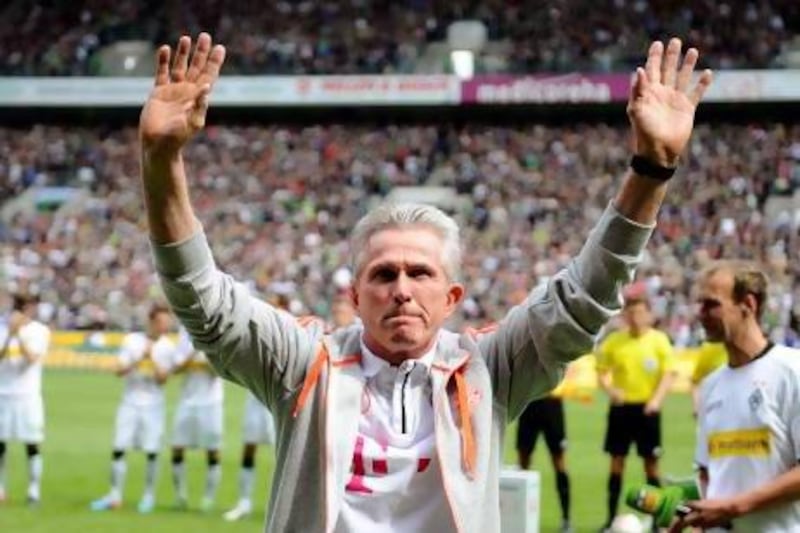It has been a good season in Europe for interim managers.
When Chelsea gave Rafa Benitez a seven-month contract and a job title that emphasised his impermanence, it looked like an insult. Benitez wrapped up his caretakership with a European trophy.
The head coach of the favourites to win the Uefa Champions League is also on a confined contract. Jupp Heynckes learnt in January he would be succeeded by Pep Guardiola at Bayern Munich at the beginning of next season.
He disliked the manner of the announcement, even if he had understood his employers were veering towards a younger coach.
Typically, his discomfort with the scenario has mostly been discreet.
That is Heynckes's way. But in the weeks building up to Saturday's showdown with Borusssia Dortmund at Wembley, he has clearly wanted the theme of Guardiola not to cloud the agenda.
Heynckes is entitled to that. His stack of achievements is already towering. His interim status has been no impediment to Bayern's winning the Bundesliga title by a record margin; reaching for the Champions League final for the second year on the trot, being in a position to complete a treble in the final of the German Cup on June 1.
This with a squad of players suffering the psychological damage of a year ago, having finished runners-up in all three competitions.
Heynckes is 68, long enough in his career to think about retirement, old enough to know that some farewells will be forever. After Bayern's last Bundesliga match of the season, last Saturday, he declared, moist-eyed, he would not be taking another job in Germany.
Bayern had just won 4-3 at Borussia Monchengladbach, the club where he played his best football, as a striker, in the 1960s and 1970s.
Fans of both teams had applauded him.
But at 68, there is also a reluctance to put a final full stop on his career.
He knows he will get offers from abroad: After all, Heynckes is on the verge of joining a very select group in his profession should Bayern defeat Dortmund. Only Ernst Happel, Ottmar Hitzfeld and Jose Mourinho have won the European Cup with two different clubs.
He won his first with Real Madrid, 15 years ago. He lost the job immediately afterwards. That Madrid should under-appreciate a head coach is scarcely a fresh story.
What is intriguing about the post-Heynckes Bayern is whether they will be deemed to have undervalued him, too.
Whatever the result on Saturday, and in the German Cup final, the monument to efficiency and swagger established over this domestic season casts an imposing shadow over Guardiola.
Bayern finished 25 points clear of second-placed Dortmund; they scored 98 times in their 34 matches; they lost only once; they conceded just 18 goals. Must Guardiola better that to prevent murmuring that the club should have stuck with Heynckes? The scrutiny on Guardiola - who for all his concentrated success in four years at Barcelona, has only ever held one senior coaching job - will be stern.
As Philipp Lahm, the Bayern captain, remarks: "When results don't come for Bayern, things get restless very fast. First you get the grumbling in the press, then finger-pointing on TV and then time runs out."
Ask Jurgen Klinsmann, who in 2008 took the Bayern coaching job with some of the fanfare now being accorded to Guardiola and left 10 months later.
Klinsmann's replacement?
An interim - Heynckes, for his second spell at Bayern, 18 years after his first stint there, which yielded two Bundesliga titles.
Ask the combative Dutchman Louis Van Gaal, who reached his point of crisis 10 months after having taken Bayern to the 2010 Champions League final.
That ushered in Heynckes for his third spell at Bayern. He brought stability, but also the blossoming of players like David Alaba and Toni Kroos, promoted from the youth ranks.
He has experienced the episodes of egotism for which the club has long had a notoriety and apparently overcome those problems with the same sober man-management that has turned the serial silver-medallists of 2012 into standard-bearers for Germany, and Europe, in 2013.
From New York, where Guardiola has spent the year since he left Barcelona on sabbatical, all this will have closely observed.
Guardiola knows he has a formidable challenge. When he took the Barcelona job, a greenhorn as a manager, he demanded that a pair of totemic players, Ronaldinho and Deco, leave.
Does he dare put such an emphatic stamp on the post-Heynckes Bayern? And how will he take the first hints of nostalgia for the distinguished veteran who built the greatest Bundesliga side of all-time?
Follow us
[ @SprtNationalUAE ]






